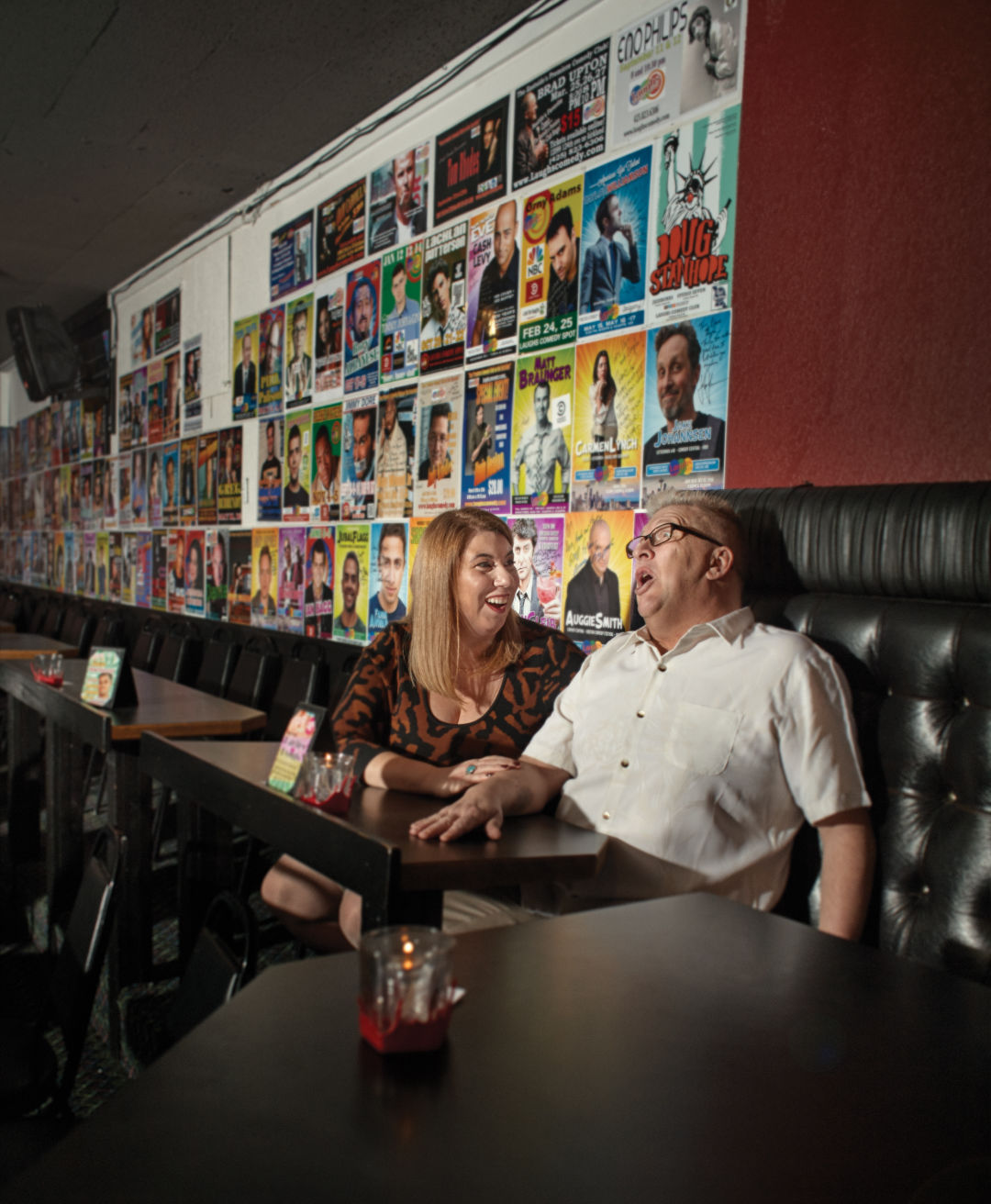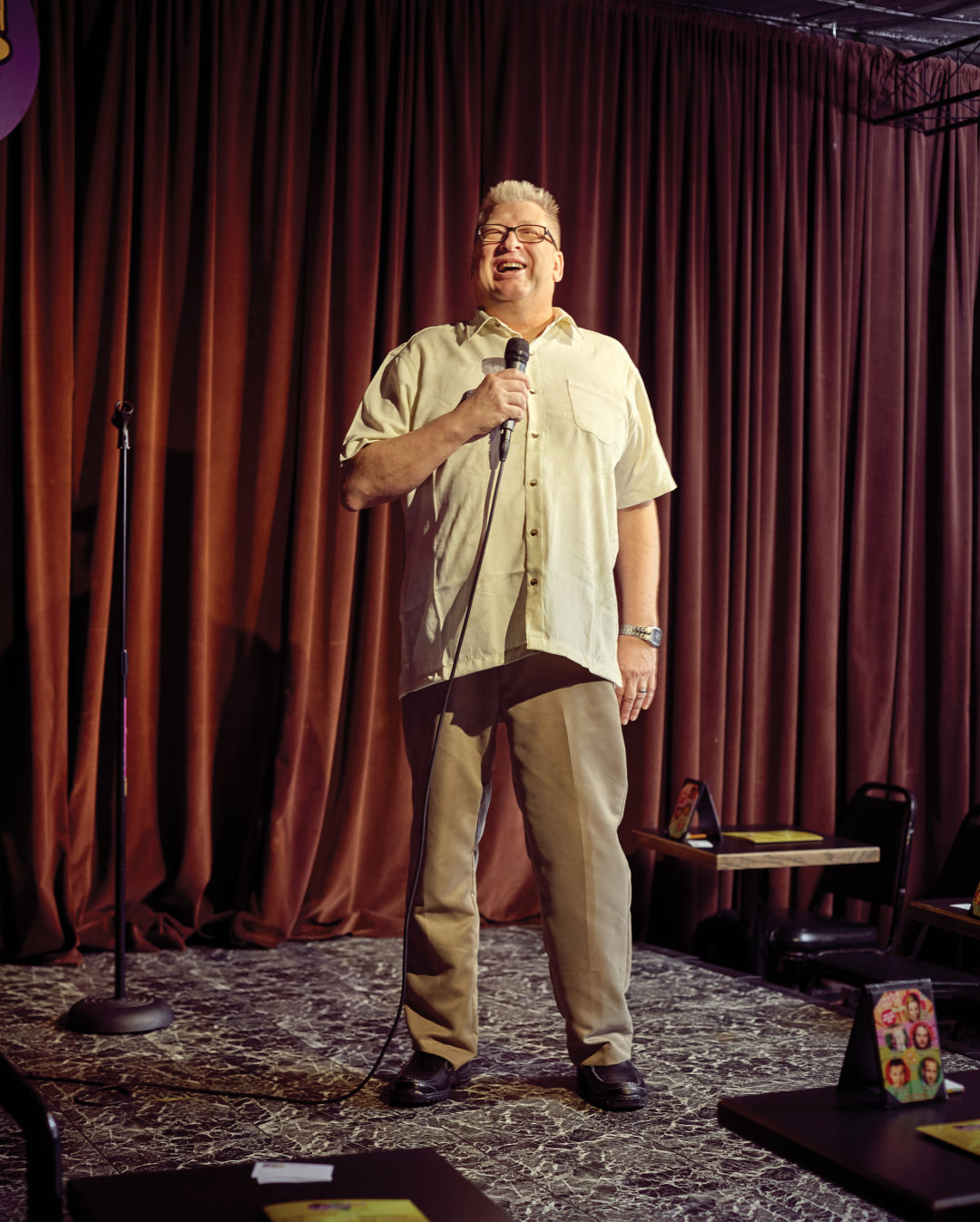The Biggest Comedy Club You (Probably) Haven't Heard Of

The Dennisons in their University District comedy club. Its wall is a shrine to visiting comedians.
Image: Tori Dickson
One hot summer night in August 2008, after wrapping up another comedy block at Bumbershoot, a group of comics including Pete Holmes, T. J. Miller, and Seth Morris arrived at the Pan Pacific to find a party bus waiting for them. Dave Dennison waited too, brandishing a Styrofoam takeout clamshell filled with Jell-O shots. “Do you guys want a bit more stage time?” he asked. After being vouched for by comic Doug Benson, Dennison drove the crew to Laughs, his comedy club in Kirkland, where the group proceeded to bring the house down until 2am.
That takeout container now adorns the wall of Laughs—which Dave and his wife, Angela, moved from Kirkland to the University District in 2016—signed by each comedian as a memorial to the after-hours performance that helped put the club on the map. Among them, and arguably the least famous at the time: Hannibal Buress.
This month, Buress returns to Laughs as a legitimate star of TV (Broad City), film (Spider-Man: Homecoming), and stand-up (his rant stirred interest in Bill Cosby’s history with women before the disgraced comedy legend’s sexual assault trial). He’ll be the biggest name to ever grace the intimate club. And that’s a big deal for the family operation. As sets at old-school comedy clubs nationwide continue to lose ground in the battle for attention—replaced here in Seattle by marquee events at the Neptune and Paramount Theatres and independent open mics held bars around Seattle—Dave and Angela Dennison’s club stubbornly remains only one of two such venues in Seattle. But their story starts down south.
Dave Dennison cut his teeth doing standup in Los Angeles in the early ’90s, where he hung out with then-emerging comics like David Cross and the late Mitch Hedberg. But an overcrowded LA comedy scene pushed Dennison to instead try carving out a space in Utah, and then the Seattle area, where he hosted comedy nights at the Bellevue Doubletree Hotel and Pegasus Pizza in Kirkland. In 2002, Angela, then a dental receptionist, dropped into one of the Pegasus shows, and the two hit it off.

Laughs co-owner Dave Dennison.
Image: Tori Dickson
“The headliner tried to fight someone in the audience,” she remembers. “I asked Dave later, ‘Is comedy usually this exciting?’ ” Not always, but exciting enough for the couple to eventually go all in, putting together a business plan for their own dedicated comedy club.
“She asked the right questions and did all the typing because my hands go everywhere,” says Dave, who has cerebral palsy. The Dennisons eventually opened the original Laughs Comedy Club in Kirkland in 2007, hosting open mics, weekend shows, and touring comics on the verge of blowing up, including Marc Maron, Tig Notaro, and Buress.
Laughs also became home court for many emerging Seattle comics, like Brett Hamil, host of The Seattle Process. In 2016, Hamil learned he would no longer have to commute to Kirkland, as the Dennisons moved the business from Kirkland to a dilapidated building in the north U District—former home of the Giggles comedy club (and the subsequent Jiggles strip club).
“Seattle doesn’t lack stages to do comedy,” says Hamil, referring to countless open mic nights. “But it’s not the same as a club, a place to work out new material for an audience there to see stand-up.” Laughs and the Comedy Underground are the only clubs of their kind in Seattle. And without them, Hamil thinks local comedians would lose out on the “midcareer phase” of booking smaller clubs before trying to headline somewhere like the Paramount.
Inside Laughs, with its low ceiling and corner stage lined with curtains to hide the stripper mirrors, the Dennisons keep it simple: bring in people they think are funny (without misogyny or homophobia). This means going to the Just for Laughs comedy festival in Montreal every year to scout new talent. They also host open mics every Wednesday. On a recent Wednesday, prospective performers waited outside before the doors even opened, shivering in the snow for the chance to get their name on the night’s lineup, many of them looking not far north of legal drinking age.
“People really love stand-up,” says Angela. She thinks young people in particular just don’t realize seeing the real thing can be as easy as (and often less expensive than) going to the movies. Like the time a pair of twentysomethings, having watched a recent Tom Segura Netflix special, decided to pop in one weekend. “They’d never seen a stand-up show live,” Angela remembers. “They were out of their minds how much fun it can be.” If Laughs keeps bringing in names like Hannibal Buress—all three nights already sold out—chances are more people will want in on the jokes.
